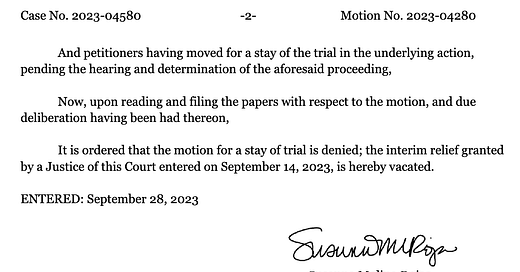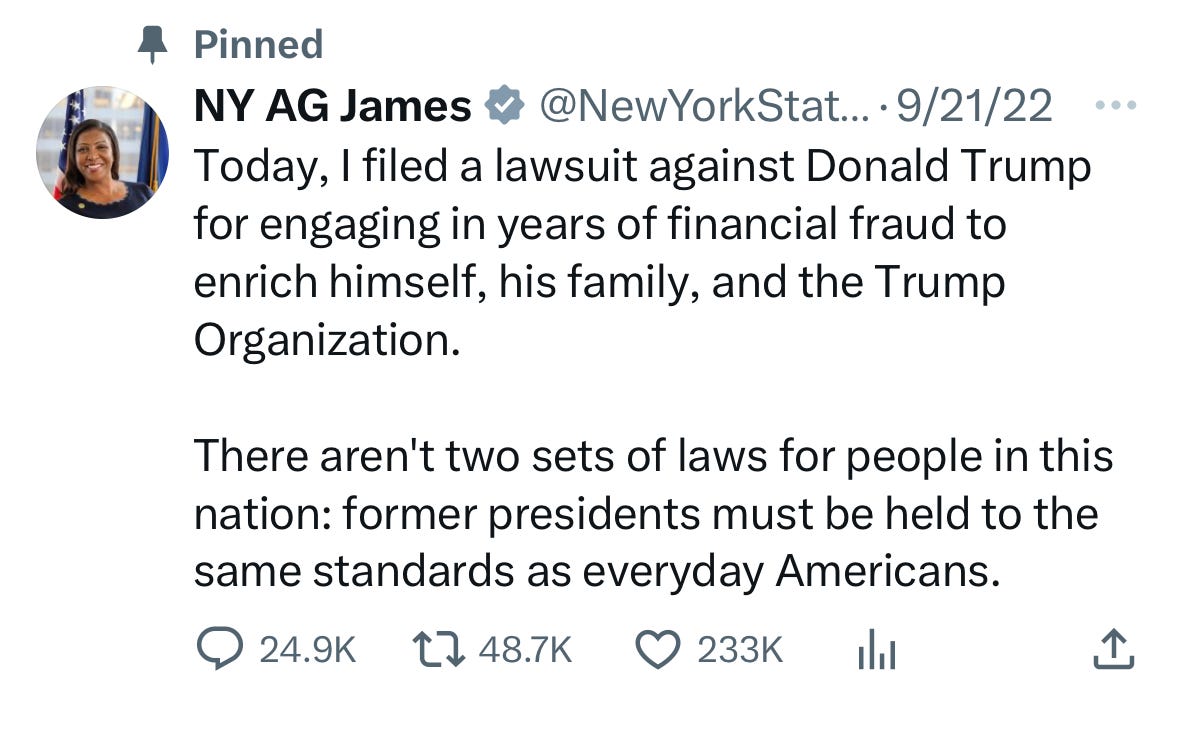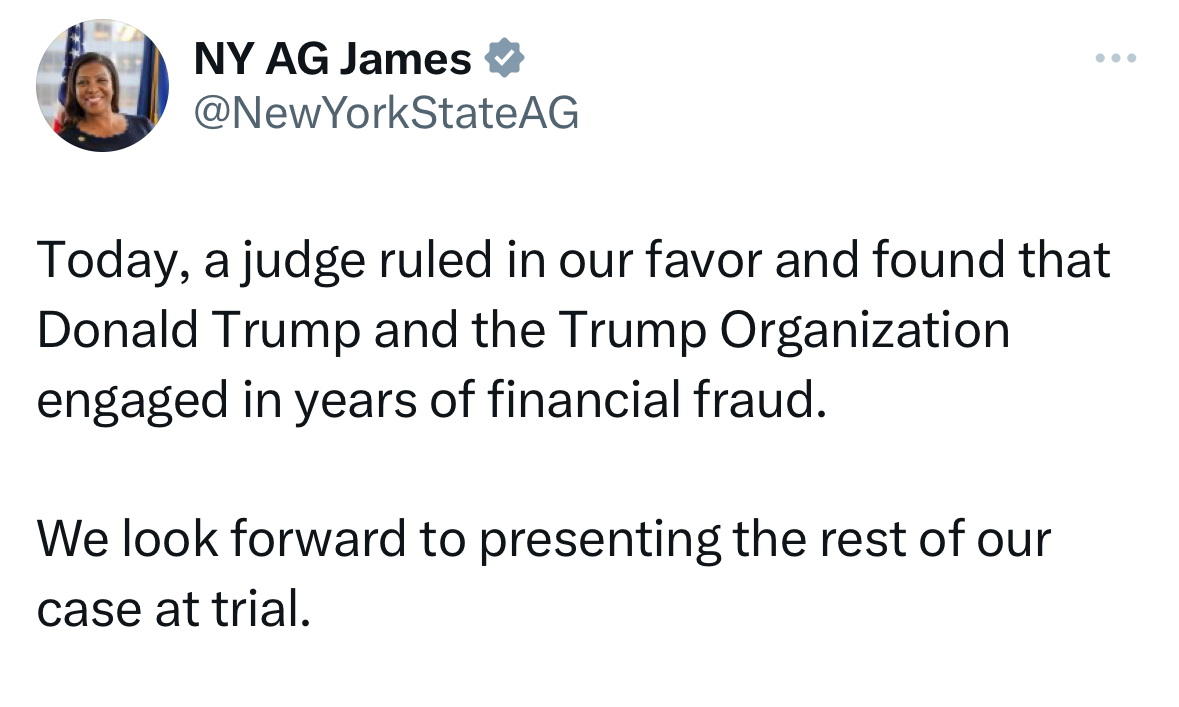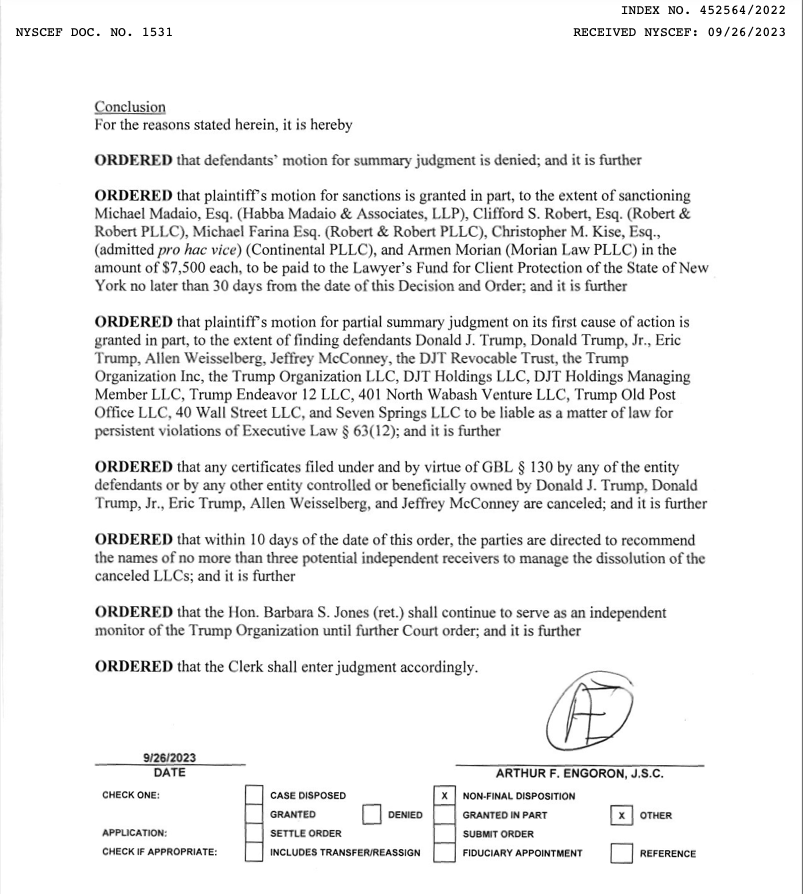Last week, the legal news came at a breakneck pace.
Friday, in his reply brief on what’s being called the “gag order” issue in the D.C. prosecution, Special Counsel Jack Smith reiterated the importance of imposing a limited set of restrictions on Donald Trump’s public comments to keep him from prejudicing the jury pool and threatening witnesses and others. Smith also alerted Judge Chutkan, in a footnote, to the possibility Trump violated the conditions of his pre-trial relief with a stunt at a South Carolina gun store. Trump’s spokesman posted a video with a caption announcing Trump purchased a Glock pistol engraved with his likeness. His spokesman tried to walk it back after the fact. But as the special prosecutor’s reply brief pointed out, the video itself showed Trump holding, i.e., “receiving” in the language of the law, a firearm. Smith pointed out the conduct is a “separate federal crime.” The irony of Trump, who as a person under indictment cannot receive a firearm, violating a provision of the same law—18 USC 922—that got Hunter Biden indicted, is rich. No word yet on whether Smith will take any action under 922(n), the provision Trump is alleged to have violated.
In Georgia, the requests by Georgia’s fake electors to remove their cases from federal court to state court were denied. Former DOJ environmental lawyer Jeff Clarke’s request met a similar fate. We’re past the deadline for defendants to file removal petitions, so that’s the end of that issue before the federal district court. The 11th Circuit has Mark Meadows appeal to decide. There may be others. Of course, this happened as Georgia bail bondsman Scott Hall was preparing to plead guilty pursuant to a cooperation agreement with the government. It turns out that Hall is the brother-in-law of David Bossie. Bossie is a conservative political activist and has been president and chairman of the conservative advocacy group Citizens United, which was the named plaintiff in the Supreme Court case that allowed corporations and special interests to pump billions of dollars into conservative campaigns. Bossie was Trump’s deputy campaign manager during the 2016 campaign. The plot thickens.
Trump co-defendant Kenneth Chesebro, whose trial will start end of this month, had his motions to dismiss the charges against him (he argued he was only a lawyer representing his clients) and to suppress some of the evidence denied. We’re on track to begin watching the trial of Chesebro and Sidney Powell on October 23. District Attorney Fani Willis has already said she will put on essentially the same case each time she tries any of the 19 defendants under indictment in that case. That means we’ll learn a great deal about her case against Donald Trump, unless Chesebro and Powell join co-defendant Hall and enter guilty pleas.
In the Mar-a-Lago case, prosecutors filed a pleading opposing Trump’s efforts to delay the entire pre-trial schedule in that case, which prosecutors say could “upend” the May 2024 trial date. Not a surprise—Trump is trying to abuse the complicated rules around classified document handling to delay his trial.
Last week was a fitting precursor for the week ahead, which is going to be action-packed. Bear with me, because there’s a lot going on.
The new Supreme Court term starts on Monday, with big arguments, including the Consumer Financial Protection Bureau case I flagged last week, which the Court hears argument in on Tuesday. Also this week, the new Georgia law that created a commission that can discipline and remove duly-elected district attorneys in Georgia goes into effect, after a Fulton County judge declined to enjoin its operation last week. The law is one of a number put forward by Republicans who want to use them against district attorneys whose policies or prosecutions they disagree with. The timing of the Georgia law substantiates the view that it’s a thinly veiled effort to punish Willis for indicting Trump. We’ll keep a close eye on any complaints that are filed.
But for this week, let’s focus on New York Attorney General Letitia James, whose civil case against the Trumps goes to trial on Monday. Or at least what’s left of it, after New York state Judge Arthur Engoron granted summary judgment in the Attorney General’s favor on fraud charges last Tuesday, leaving several others charges and the issue of damages to be decided at trial.
The trial is a bench trial—the case will be decided by the judge, not by a jury. Judge Engoron is a distinguished jurist who has spent two decades on the bench and whose increasing frustration with Trump’s continuous efforts to unfairly delay the proceedings in this case was apparent by the time he ruled on the raud claims last week.
Trump’s effort to stay the trial at the last minute was rejected last week when a New York appellate judge lifted a temporary stay and ruled that Monday’s trial could proceed.
James filed her lawsuit in September of 2022 after three-plus years of investigation was sparked by Michael Cohen’s testimony before Congress that Trump routinely misrepresented his wealth for financial gain. She sued Donald Trump and his three adult children, alleging they used fraudulent statements of the Trump Organization’s financial condition to obtain millions in economic benefits. Allen Weisselberg and Jeffrey McConney, two of Trump’s senior management officials, and trusts, holding companies, and other entities that make up the Trump Organization were also named as defendants.
The lawsuit accused Trump of inflating his net worth by billions of dollars and misleading banks, insurance companies and others about the value of his assets, including golf courses and the Mar-a-Lago estate, in order to obtain advantageous terms in financial dealings and minimize tax payments. Ivanka Trump was dismissed as a defendant in June of 2023. An appellate court ruled that claims against her were barred by the statute of limitations, because she’d stepped away from the business after 2016, and couldn’t be linked to anything that happened after that. But both Donald Trump Jr. and Eric Trump remain in the case. Junior was the source of valuations on properties like Trump Park Avenue, and was responsible for statement preparation from 2016 to the present. He certified Trump Organization financials from 2017 to 2019. Eric was the source of the valuations for the Seven Springs property, and certified statements in 2020 and 2021.
The lawsuit was filed under New York Executive Law 63(12), which gives the Attorney General power to go after repeated fraud and illegality, and prevent companies that engage in persistent fraud from continuing to do business in the state of New York. The lawsuit asks the court to remove Trump and the others from their Trump organization roles, permanently ban them from future corporate leadership roles in New York, bar Mr. Trump and the Trump Organization from entering into any New York real estate acquisitions for five years, and force the defendants to disgorge $250 million in profit the Attorney General says they illegally obtained as a result of their ongoing fraud.
You’ll recall there was a lot of invocation of Fifth Amendment privilege against self-incrimination when it came to depositions of defendants in this case. And in April of this year, Attorney General James filed a motion to hold Donald Trump in contempt after he failed to comply with the Judge’s order to turn over documents in discovery. Trump ultimately complied after the Judge imposed daily fines until he did. Trump subsequently sat for a deposition. In a civil case, unlike in a criminal one, a defendant’s invocation of his Fifth Amendment privilege can be introduced in evidence, and the decision-maker is able to draw a negative inference from the failure to answer.
But even before the trial started, James won a major victory. Last week, on Tuesday, Judge Engoron granted summary judgment on her fraud claims. Granting summary judgment means that based on all of the evidence that has been amassed during discovery in the case, including documents and deposition testimony, there are no disputes about material facts for a jury (or in this case, the judge who is sitting as the decision-maker) to decide.
The Judge ruled that as a matter of law, James was entitled to prevail on her fraud claims against the Trumps and Trump Organization. The decision is tantamount to a corporate death penalty, making it impossible for Trump to continue to do business in New York, which is the heart of his operation. Judge Engoron entered the following remedial order:
Because the Judge ordered their certificates withdrawn, the Trumps can no longer do business in the state. General Business Law Section 130 clarifies how canceling the certificates impacts their ability to do business:
“1. No person shall hereafter (i) carry on or conduct or transact business in this state…unless:
(a) Such person…shall file in the office of the clerk of each county in which such business is conducted or transacted a certificate setting forth the name or designation under which and the address within the county at which such business is conducted or transacted, the full name or names of the person or persons conducting or transacting the same, including the names of all partners, with the residence address of each such person, and the age of any person less than eighteen years of age.”
There are additional provisions in the law, found here, but this is the heart of it. No certificate, no doing business. And the Judge entered the order against the Trumps’ closest business associates as well, so there will be no straw men working on their behalf. The order likely impacts Trump’s ability to do business outside of New York as well—for one thing, what lender, after reading the court’s conclusions, would believe that doing business with Trump is worth the risk?
The Court will also appoint an independent receiver to dissolve the network of limited liability corporations that makes up Trump’s former empire.
There are six remaining claims against Trump that still need to be resolved at trial. They include falsifying business records, issuing false financial statements, and insurance fraud. But the big issues will be the amount of damages the Judge will order and whether it will approach the $250 million James is seeking.
When a state attorney general wins a case like this, it’s more than a personal victory for a lawyer. It’s a victory on behalf of the people. New York has laws like the ones James used here to protect the people of the state of New York from companies that engage in unethical business practices. For Trump, obtaining business advantage by offering fraudulent valuations was the normal course of doing business. As he continues to face criminal charges in four separate cases, it’s this one, the civil case, that strikes first. And despite Trump’s blustery demeanor and his now-tired cries of witch hunt, this inevitably hits him hard. It’s the end of the myth that he’s a successful businessman. Judge Engoron wrote in his summary judgment order that Trump’s claims amounted to “a fantasy world, not the real world.” This week, the real world draws ever closer for Trump and it brings real world consequences.
We’re in this together,
Joyce









Thank you for the update; it clarified several points for me. Net is, even though we seem like it’s glacial progress in holding that man accountable for all of his sleaze, it is progress nevertheless. And I must say I’m looking forward to the televised trial(s), and your continued clarifications and explanations. Thank you!
Thanks for doing all the hard work for us Mrs Vance. I am not sure any of us knew a year ago how deep and complicated these matters would become. Good to see the Civil case come to fruition.